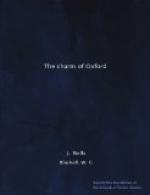Colet’s lectures on the Epistle to the Romans, perhaps delivered in Magdalen College, marked an epoch in the way of the interpretation of Holy Scripture, by their freedom from traditional methods and by their endeavour to employ the best of the New Learning in determining the real meaning of the Apostle. To the same school as Colet in the Church belonged Reginald Pole, Archbishop in the gloomy days of Queen Mary, the only Magdalen man who has held the See of Canterbury.
Elizabeth visited the College, and gently rebuked the Puritan tendencies of the then President, Dr. Humphrey, who carried his scruples so far as to object to the academical scarlet he had to wear as a Doctor of Divinity, because it savoured of the “Scarlet Woman.” “Dr. Humphrey,” said the queen, with the tact alike of a Tudor sovereign and of a true woman, “methinks this gown and habit become you very well, and I marvel that you are so strait-laced on this point—but I come not now to chide.” This President complained that his headship was “more payneful than gayneful,” a charge not usually brought against headships at Oxford.
In the seventeenth century, Magdalen was, for a short time, the very centre of England’s interest. James II, in his desire to force Roman Catholicism on Oxford, tried to fill the vacant Presidency with one of his co-religionists. His first nominee was not only disqualified under the statutes, but was also a man of so notoriously bad a character that even the king had to drop him. Meanwhile, the fellows, having waited, in order to oblige James, till the last possible moment allowed by the statutes, filled up the vacancy by electing one of their own number, John Hough. When the king pronounced this election irregular and demanded the removal of the President and the acceptance of his second nominee, the fellows declared themselves unable thus to violate their statutes, even at royal command, and were accordingly driven out. The “demies,” who were offered nominations to the fellowships thus rendered vacant, supported their seniors, and, in their turn, too, were driven out; they had showed their contempt for James’ intruded fellows by “cocking their hats” at them, and by drinking confusion to the Pope. When the landing of William of Orange was threatening, James revoked all these arbitrary proceedings, but it was too late; he had brought home, by a striking example, to Oxford and to England, that no amount of past services, no worthiness of character, no statutes, however clear and binding, were to weigh for a moment with a royal bigot, who claimed the power to “dispense” with any statutes. The “Restoration” of the Fellows on October 25, 1688, is still celebrated by a College Gaudy, when the toast for the evening is jus suum cuique.
Hough remained President for thirteen years, during most of which time he was bishop—first of Oxford and then of Lichfield. He finally was translated to Worcester, where he died at the age of ninety-three, after declining the Archbishopric of Canterbury. His monument, in his cathedral, records his famous resistance to arbitrary authority.




